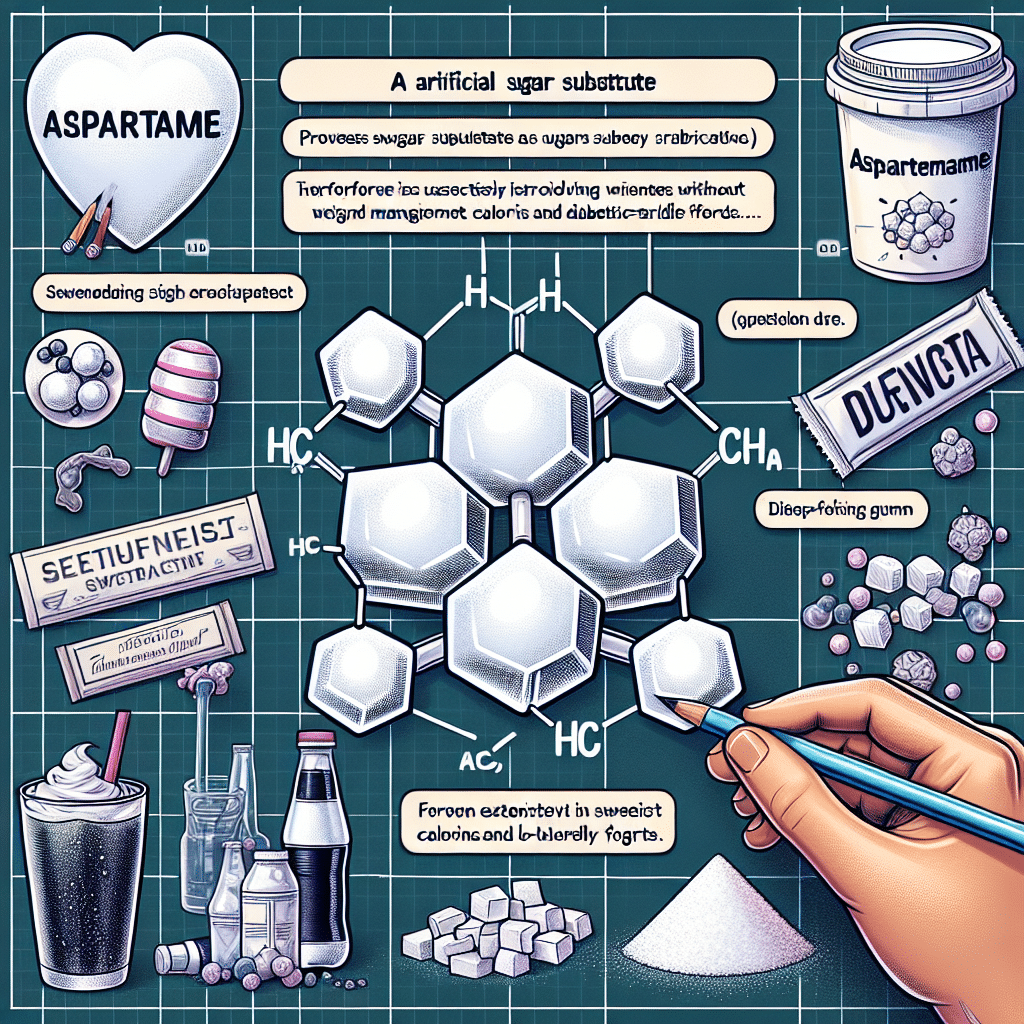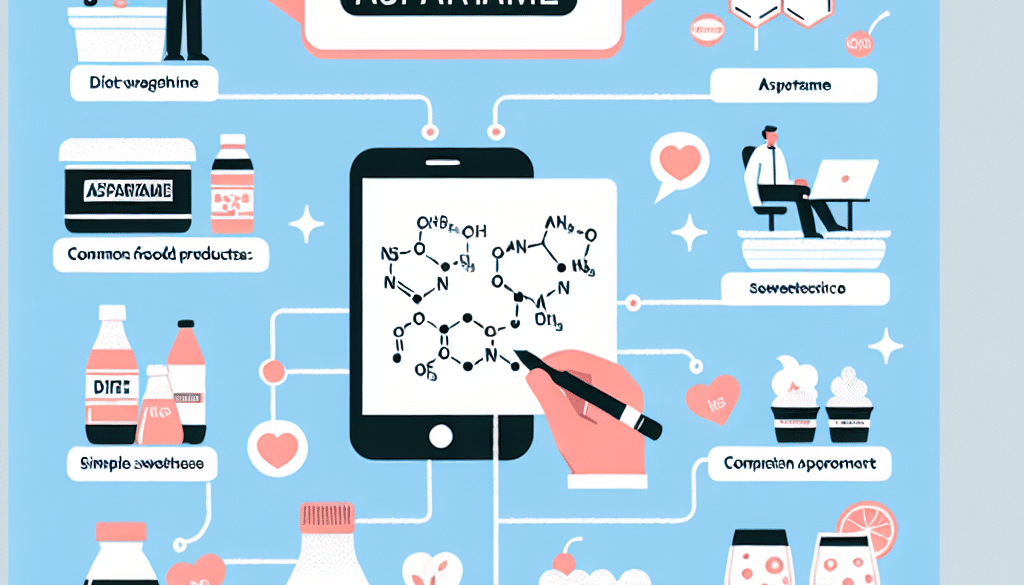What is aspartame and why use it in food processing?
-
Table of Contents
- Aspartame: Understanding Its Role in Food Processing
- What is Aspartame?
- History and Approval of Aspartame
- Why Use Aspartame in Food Processing?
- Applications of Aspartame in Food Products
- Controversies and Safety of Aspartame
- Case Studies and Statistics
- Conclusion
- Explore ETprotein’s Protein Products
Aspartame: Understanding Its Role in Food Processing

Aspartame is a widely used artificial sweetener that has become a household name since its discovery in the 1960s. It’s found in a variety of food and beverage products, from diet sodas to sugar-free desserts. Despite its prevalence, aspartame remains a topic of discussion and debate regarding its safety and benefits. This article delves into what aspartame is, its role in food processing, and the reasons behind its widespread use.
What is Aspartame?
Aspartame is a low-calorie sweetener that is approximately 200 times sweeter than sucrose, or table sugar. Chemically, it is a methyl ester of the aspartic acid/phenylalanine dipeptide. Upon ingestion, aspartame breaks down into its constituent amino acids, aspartic acid and phenylalanine, as well as methanol, which are all naturally occurring substances in foods we consume regularly.
History and Approval of Aspartame
Aspartame was discovered in 1965 by James M. Schlatter, a chemist working on an anti-ulcer drug. It was approved for use in food products by the United States Food and Drug Administration (FDA) in 1981. Since then, it has been approved by more than 100 countries around the world, including the European Food Safety Authority (EFSA) and the World Health Organization (WHO).
Why Use Aspartame in Food Processing?
There are several reasons why food manufacturers choose aspartame as a sweetener:
- Calorie Control: Aspartame offers a sweet taste without the calories associated with sugar, making it an attractive option for weight management and diet products.
- Taste Profile: Its taste is very similar to that of sugar, which makes it a preferred choice in formulations where maintaining the traditional taste of the product is important.
- Dental Health: Unlike sugar, aspartame does not contribute to tooth decay, which is why it’s often found in chewing gum and dental health products.
- Stability: Aspartame is stable under heat and within a wide pH range, making it suitable for use in baking and other cooking applications.
- Diabetic-Friendly: Aspartame does not raise blood glucose levels, making it a safe sweetener for people with diabetes.
Applications of Aspartame in Food Products
Aspartame’s versatility makes it a popular choice in a variety of food and beverage products. Here are some common applications:
- Diet sodas and other low-calorie drinks
- Sugar-free desserts such as gelatins, puddings, and ice cream
- Chewing gum and breath mints
- Yogurts and other dairy products
- Condiments and dressings
- Meal replacements and dietary supplements
Controversies and Safety of Aspartame
Despite its widespread acceptance by regulatory agencies, aspartame has been the subject of controversy over the years. Concerns have been raised about its potential health effects, including headaches, dizziness, and even more serious conditions. However, extensive research, including hundreds of studies, has consistently shown that aspartame is safe for human consumption at recommended levels.
The Acceptable Daily Intake (ADI) for aspartame, set by the FDA, is 50 milligrams per kilogram of body weight. To put this into perspective, an average adult would have to consume more than 19 cans of a diet soft drink every day to exceed the ADI, a quantity far beyond typical consumption.
Case Studies and Statistics
Several studies have demonstrated the benefits of aspartame in weight management. For instance, a study published in the American Journal of Clinical Nutrition found that participants who switched to aspartame-sweetened beverages from sugar-sweetened ones experienced significant weight loss.
Statistics show that aspartame is one of the most popular artificial sweeteners on the market. According to a report by Grand View Research, the global aspartame market size was valued at USD 637.1 million in 2019 and is expected to grow, indicating its continued popularity in food processing.
Conclusion
Aspartame is a key ingredient in the food industry, offering sweetness without the added calories of sugar. Its safety has been affirmed by numerous health authorities, and its benefits for weight management and diabetic-friendly products make it a valuable tool for food manufacturers. While controversies may persist, the scientific consensus supports the moderate use of aspartame as part of a balanced diet.
Explore ETprotein’s Protein Products
If you’re looking for high-quality protein products to complement your diet or food processing needs, consider ETprotein’s offerings. Their range of organic bulk vegan proteins and L-(+)-Ergothioneine (EGT) products cater to various industries, ensuring that you have access to premium ingredients for your nutritional supplements and food products.
About ETprotein:
ETprotein, a reputable protein and L-(+)-Ergothioneine (EGT) Chinese factory manufacturer and supplier, is renowned for producing, stocking, exporting, and delivering the highest quality organic bulk vegan proteins and L-(+)-Ergothioneine. They include Organic rice protein, clear rice protein, pea protein, clear pea protein, watermelon seed protein, pumpkin seed protein, sunflower seed protein, mung bean protein, peanut protein, and L-(+)-Ergothioneine EGT Pharmaceutical grade, L-(+)-Ergothioneine EGT food grade, L-(+)-Ergothioneine EGT cosmetic grade, L-(+)-Ergothioneine EGT reference grade and L-(+)-Ergothioneine EGT standard. Their offerings, characterized by a neutral taste, non-GMO, allergen-free attributes, with L-(+)-Ergothioneine purity over 98%, 99%, cater to a diverse range of industries. They serve nutraceutical, pharmaceutical, cosmeceutical, veterinary, as well as food and beverage finished product distributors, traders, and manufacturers across Europe, USA, Canada, Australia, Thailand, Japan, Korea, Brazil, and Chile, among others.
ETprotein specialization includes exporting and delivering tailor-made protein powder and finished nutritional supplements. Their extensive product range covers sectors like Food and Beverage, Sports Nutrition, Weight Management, Dietary Supplements, Health and Wellness Products, and Infant Formula, ensuring comprehensive solutions to meet all your protein needs.
As a trusted company by leading global food and beverage brands and Fortune 500 companies, ETprotein reinforces China’s reputation in the global arena. For more information or to sample their products, please contact them and email sales(at)ETprotein.com today.














